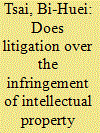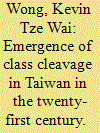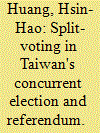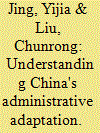| Srl | Item |
| 1 |
ID:
101203


|
|
|
|
|
| Publication |
2010.
|
| Summary/Abstract |
This paper seeks to clarify the relationship between intellectual property right (IPR) infringement lawsuits and innovation by firms through an analysis of data from eighty-seven Taiwanese integrated circuit (IC) manufacturers in the period 2001-2006. The results show that the rapid growth in patent grant is positively related to the occurrence of patent infringement lawsuits, which implies that IPR infringement litigation strengthens firms' incentives to innovate. Patent holders adopt an "aggressive strategy" that makes use of the offensive function of patents to initiate lawsuits against alleged violators. The defendants then adopt a "regressive strategy" by building up "patent walls" to refute the charge and defend themselves. In addition, Taiwanese IC firms are more inclined to develop patents when they are defendants rather thanwhen they are plaintiffs. This suggests that the defensive function of patents has a more profound impact than the offensive function for Taiwanese IC firms. These firms do not possess the core technology needed in IC-relatedmanufacturing processes,and they have in the past applied other firms' technology without obtaining legal licenses. In response to accusations of infringement, Taiwanese IC firms adopt a "regressive strategy," encouraging their employees to develop patents which they then use to refute the charge of IPR infringement.In addition, it is found that stock-based bonuses are a better incentive for encouraging employees to develop patents for their firms.
|
|
|
|
|
|
|
|
|
|
|
|
|
|
|
|
| 2 |
ID:
101202


|
|
|
|
|
| Publication |
2010.
|
| Summary/Abstract |
This paper shows that, in Taiwan, political cleavage based on class (class cleavage) has developed since the beginning of the new millennium due to the increasingly important issue of cross-Strait economic integration.Class groups with more skills that benefit from this integration and the less skilledwho are harmed by it are polarized into two opposite camps.Responding to these class groups, the twomajor political camps in Taiwan incorporate this issue into their political platforms. The pan-Blue coalition urges further cross-Strait economic integration, while the pan-Green coalition holds the opposite view. Using the datasets of the Taiwan Social Change Survey (????????), this paper demonstrates that in the 2001 and 2004 legislative elections as well as in the 2004 presidential election,class groups oriented in favor of cross-Strait economic integration have allied with the pan-Blue coalition, while the opposing class groups support the pan-Green coalition.
|
|
|
|
|
|
|
|
|
|
|
|
|
|
|
|
| 3 |
ID:
101204


|
|
|
|
|
| Publication |
2010.
|
| Summary/Abstract |
The aim of this paper is to identify proper legal provisions for regulating plant closure in Taiwan. The main argument is that an "ideal"model for such provisions can be developed by embedding the proposed law within its social context. From information obtained through in-depth interviews, I find that a proper plant closure law needs to take into consideration the demands of key actors by striking a balance between managerial prerogative and job security. The paper concludes by proposing a new approach for regulating plant closure in Taiwan.
|
|
|
|
|
|
|
|
|
|
|
|
|
|
|
|
| 4 |
ID:
101200


|
|
|
|
|
| Publication |
2010.
|
| Summary/Abstract |
The growth and transformation of state-owned enterprises (SOEs) in a changing socialist China has long been a popular focus of scholarly attention.Relatively little has been done to explain the growth dynamics and regional variation of China's SOEs. This paper investigates the spatial variation of China's SOEs through a comparative analysis of SOEs in northeast and southChina. A detailed comparison of SOEs in the machinery industry sector located in Shenyang in the northeast and Guangzhou in the south has revealed an interesting pattern inwhich SOEs in the two locations were positioned in different production environments characterized by different norms of market competition and different types of political ties with the central state. The non-price norm of market competition and a political commitment to a state strategy of key equipment indigenization have provided incentives for SOEs in Shenyang to adopt a technically-oriented and independent-brand-based growth strategy in their direct engagements with transnational corporations, and these engagements have caused them to pursue the rapid expansion of production capacity and sales income at the expense of capital efficiency and external economies. In contrast, the pressures ofmarket competition plus hardened budget constraints enforced by local governments has forced SOEs in Guangzhou to fall back on externally malleable production linkages and inter-firm networks, which have enabled them to adapt to emerging markets during the economic transition. While SOEs in the two locations share the same public property rights arrangements and operate in the same industrial sector, they are actually "different dreams" within the "same bed."
|
|
|
|
|
|
|
|
|
|
|
|
|
|
|
|
| 5 |
ID:
101201


|
|
|
|
|
| Publication |
2010.
|
| Summary/Abstract |
Exploring the issue of referendum voting has become an important aid to understanding the development of democracy in Taiwan. Three referendums on six issues have been held since 2004, and each of them has been held in conjunction with a nationwide election. This paper uses the approach of straight/split-ticket voting to explore Taiwan's referendum voting behavior. Through a case study of the 2008 presidential election,this paper draws ecological inferences from aggregate data and examines the effects of different social contexts on split voting by KMT and DPP voters. By using Wakefield's hierarchical method, it is shown that whether Taiwanese voters picked up referendum ballots in 2008 depended mostly on which party they voted for in the presidential election. This finding indicates that partisanship remained influential in referendum voting of Taiwan. However, social context also matters from the viewpoint of information transmission. This paper examines split-voting behavior by region and addresses different contextual measurements of the political support,economic development, and ethnic cohesion as exploratory factors. By using aggregate data to probe local opinion, this paper provides an alternative approach to explaining voting behavior by regional difference.
|
|
|
|
|
|
|
|
|
|
|
|
|
|
|
|
| 6 |
ID:
101199


|
|
|
|
|
| Publication |
2010.
|
| Summary/Abstract |
This paper provides an alternative perspective on the post-1978 incremental adaptation of the Chinese administrative state. Unlike other studies that focus on the centralized reforms of the rationalized state or fragmentation and competition within the state, this paper analyzes the neglected strategies of self-empowerment adopted by weak administrative organizations and the subsequent impacts on administrative adaptation from an institutional-organizational perspective. Our case study on the organizational dynamics of ageing management suggests that weak or-ganizations, as peripheral insiders of the regime, are aware of their weakness and are skillful in utilizing mixed strategies, in a risk-averse way, to take advantage of the opportunities and resources emerging from the increasingly plural and diverse institutional environment. Most notably,these organizations partially assume and partially offset the role of the potentially disobedient external organization. Overall, their behavior creates and enlarges the pores through which modern administrative values and practices penetrate the transitional Chinese administrative state.
|
|
|
|
|
|
|
|
|
|
|
|
|
|
|
|